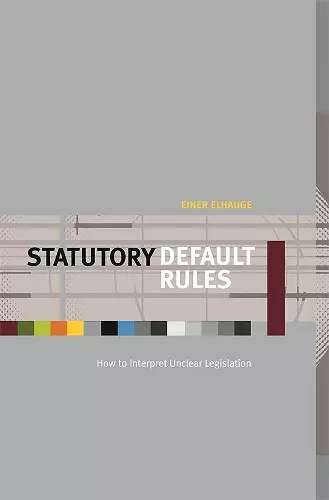Statutory Default Rules
How to Interpret Unclear Legislation
Format:Hardback
Publisher:Harvard University Press
Published:29th Mar '08
Currently unavailable, and unfortunately no date known when it will be back

Statutory Default Rules is an important contribution to the debate over legal interpretation. It rehabilitates the imaginative-reconstruction approach of Learned Hand and gives it new intellectual foundations, including a sophisticated appreciation of relevant social science. -- Adrian Vermeule, Harvard Law School An important contribution to the field, cogently written and well-organized, it will spark lively discussion in a domain of legal scholarship that could certainly use it. -- Mariano-Florentino Cuellar, Stanford Law School The book is a masterpiece which I will be using in my own work (hopefully) for decades to come! -- Jonathan Macey, Yale Law School
Most new law is statutory law; that is, law enacted by legislators. An important question, therefore, is how should this law be interpreted by courts and agencies, especially when the text of a statute is not entirely clear. This book focuses on what judges should do once the legal materials fail to resolve the interpretive question.
Most new law is statutory law; that is, law enacted by legislators. An important question, therefore, is how should this law be interpreted by courts and agencies, especially when the text of a statute is not entirely clear. There is a great deal of scholarly literature on the rules and legal materials courts should use in interpreting statutes. This book takes a fresh approach by focusing instead on what judges should do once the legal materials fail to resolve the interpretive question. It challenges the common assumption that in such cases judges should exercise interstitial lawmaking power. Instead, it argues that--wherever one believes the interpretive inquiry has failed to resolve the statutory meaning--judges can and should use statutory default rules that are designed to maximize the satisfaction of enactable political preferences; that is, the political preferences of the polity that are shared among enough elected officials that they could and would be enacted into law if the issue were on the legislative agenda.
These default rules explain many recent high-profile cases, including the Guantánamo detainees case, the sentencing guidelines case, the decision denying the FDA authority to regulate cigarettes, and the case that refused to allow the attorney general to criminalize drugs used in physician-assisted suicide.
Statutory Default Rules is an important contribution to the debate over legal interpretation. It rehabilitates the imaginative-reconstruction approach of Learned Hand and gives it new intellectual foundations, including a sophisticated appreciation of relevant social science. -- Adrian Vermeule, Harvard Law School
An important contribution to the field, cogently written and well-organized, it will spark lively discussion in a domain of legal scholarship that could certainly use it. -- Mariano-Florentino Cuellar, Stanford Law School
The book is a masterpiece which I will be using in my own work (hopefully) for decades to come! -- Jonathan Macey, Yale Law School
ISBN: 9780674024601
Dimensions: unknown
Weight: unknown
400 pages